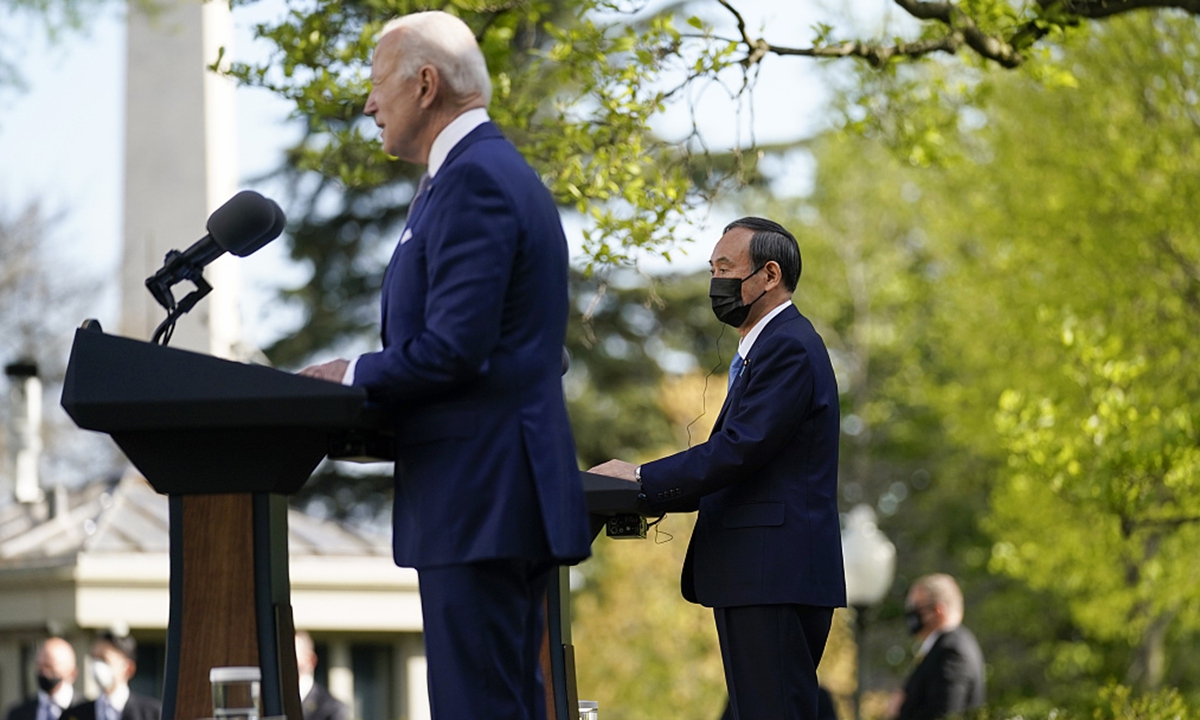
US President Joe Biden and visiting Japanese Prime Minister Yoshihide Suga on Friday issued a joint statement which mainly themed on dealing with China. The statement talked a lot about the importance of the US-Japan alliance, an alliance being touted as "US-Japan global partnership for a new era." In the statement, the two countries pledge to work together to resist "challenges to the free and open rules-based international order." The statement outlined the situation in the Indo-Pacific region, accusing China of conducting "economic and other forms of coercion" in the region. It also mentioned the Taiwan question - the first time since 1969 American and Japanese top leaders have done so in their joint statement.
"An ocean separates our countries, but commitments to universal values and common principles, including freedom, democracy, human rights, the rule of law, international law, multilateralism, and a free and fair economic order, unite us," said part of the statement. But this sentimental rhetoric is hypocritical. US-Japan ties are a kind of relationship that a victory country of the WWII dominates a defeated country, Japan. There is a strong "master-servant" feature in this relationship in terms of diplomacy. The joint statement has strengthened the compulsive dominance the US' extreme China policy has on Japan's diplomacy, while Japan has actively and cautiously catered to it.
Japan has become the country in Asia that follows the US policy of containing China most closely. There are two reasons for this: First, as mentioned above, the US has so far maintained its military occupation of Japan and it can be said that Japan's diplomacy is only at "semi-sovereign" level. It's unlikely for Japan to contradict the US.
Second, Japan is the Asian country that most wants to contain China. The biggest "shared value" between the US and Japan is actually the jealousy and hatred they both have against China's strong development momentum. The US' hegemonic thinking can't accept its status being matched by China, while Japan can't accept becoming a "second-class country" compared to China, again.
Has Japan forgotten how many times it inflicted devastation on China? Has China ever truly harmed Japan and can Japan cite an example? The tiny Diaoyu Islands are just a territorial dispute between China and Japan, and in Asia there are many similar disputes. But Japan takes the dispute as a strategic level issue and hypes it up every day. What's the point of it?
The US-Japan alliance could evolve into an axis that can bring fatal disruption to Asia-Pacific peace, just like the Germany-Italy-Japan axis alliance before and during the WWII. The core intention of the US is to maintain its hegemony and contain China's development through violating international laws and rules. The arbitrary act of the US could eventually end the peace in Asia-Pacific. And Japan is positioning itself as the top Asian accomplice of the US' vicious policy.
Washington and Tokyo want to build the Quad mechanism, comprising Japan, the US, India and Australia, into an expanded and upgraded US-Japan alliance, and draw more countries in to jointly confront China. They trumpeted "shared values," but the world is supposed to be diverse. The most dangerous thing is confrontation, group-based confrontation in particular. The US and Japan are tearing the so-called "Indo-Pacific" apart at the cost of eroding and destroying cooperation. They are attempting to make confrontation the main theme of the entire region.
They always emphasized "rules-based," but the rules should refer to those made by the UN., rather than those defined by the US and Japan. The US has willfully wielded the stick of trade war against China, and cracked down on Chinese high-tech enterprises by cutting off the supply of key technology products. Are these actions in line with the rules? The US is enticing Japan to establish supply chains that exclude China. But does this comply with rules? Besides, the US and the West arbitrarily interfere in internal affairs of other countries, is this encouraged by the UN Charter?
Japan once met China halfway in the past few years, which led the China-Japan relations to return on the right track. But now, it has abruptly changed the course and become a part of the US containment strategy against China. This has ruined the momentum of improvement in China-Japan relations. It's not only a result of US' pressure, but it's also caused by Japan's expanding strategic selfishness. Japan is too short-sighted, it formed an alliance with Germany and Italy before WWII and is now singing a chorus with the US' radical line. Japan hasn't learned its lessons. It is, instead, proactively creating and sinking into a vortex of confrontation.
Finally, we advise Japan to stay away from the Taiwan question. It may play diplomatic tricks in other fields, but if it gets involved into the Taiwan question, it will draw the fire upon itself. The deeper it is embroiled in, the bigger the price it will pay.













